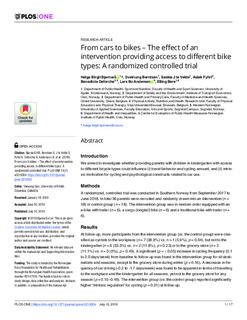| dc.description.abstract | Introduction
We aimed to investigate whether providing parents with children in kindergarten with access to different bicycle types could influence (i) travel behavior and cycling amount, and (ii) intrinsic motivation for cycling and psychological constructs related to car use.
Methods
A randomized, controlled trial was conducted in Southern Norway from September 2017 to June 2018. In total 36 parents were recruited and randomly drawn into an intervention (n = 18) or control group (n = 18). The intervention group was in random order equipped with an e-bike with trailer (n = 6), a cargo (longtail) bike (n = 6) and a traditional bike with trailer (n = 6).
Results
At follow-up, more participants from the intervention group (vs. the control group) were classified as cyclists to the workplace (n = 7 (38.9%) vs. n = 1 (5.9%), p = 0.04), but not to the kindergarten (n = 6 (33.3%) vs. n = 2 (11.8%), p = 0.23) or to the grocery store (n = 2 (11.1%) vs. n = 0 (0%), p = 0.49). A significant (p = ≤0.05) increase in cycling frequency (0.1 to 2.0 days/week) from baseline to follow-up was found in the intervention group for all destinations and seasons, except to the grocery store during winter (p = 0.16). A decrease in frequency of car driving (-0.2 to -1.7 days/week) was found to be apparent in terms of travelling to the workplace and the kindergarten for all seasons, yet not to the grocery store for any season (p = 0.15–0.49). The intervention group (vs. the control group) reported significantly higher “intrinsic regulation” for cycling (p = 0.01) at follow-up.
Conclusion
Access to different bike types for parents with children attending kindergarten resulted in overall increased cycling, decreased car use and higher intrinsic motivation for cycling. E-bikes obtained the greatest cycling amount in total, with the smallest sample variability. Hence, providing parents with children in kindergarten with access to e-bikes might result in increased and sustained cycling, also during the winter season. | nb_NO |

